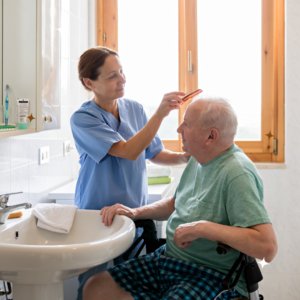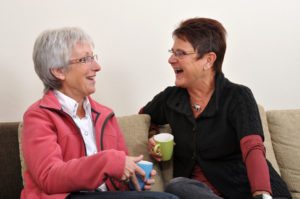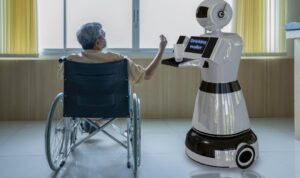Posts Tagged ‘alzheimer’s care’
What is Sundowners and How To Prevent Sleeplessness
Ever wondered why your loved one becomes more agitated in the evening hours? Or do you want your loved one with dementia to sleep better? Sundowning is a condition that leads to agitation and anxiety as the sun starts to set during the day. In people with dementia, This can last for less than an hour up to all hours of the night causing agitation, anxiety, and restlessness.
Read MoreHome Modifications for Dementia Care: A Room-by-Room Guide
Caring for a loved one with dementia requires more than emotional and physical support—it also involves creating a safe, structured, and comfortable living environment. Home modifications can help reduce confusion, prevent accidents, and promote independence. This room-by-room guide will help caregivers adapt a home for someone with dementia, ensuring safety and ease of navigation.
Read MoreIs It Okay to Lie to My Loved One with Dementia? How to Navigate Difficult Conversations, Refusals, and Repetitive Questions
Dementia affects the brain’s ability to process and retain new information, leading to confusion, memory loss, and disorientation. Over time, individuals with dementia may struggle to differentiate between past and present, forget significant life events, or misinterpret their surroundings. In these moments, insisting on the “truth” can sometimes lead to distress, agitation, or unnecessary confrontation.
This is where the concept of therapeutic lying or compassionate communication comes into play. Instead of focusing on absolute truth, caregivers must prioritize their loved one’s emotional state and sense of security.
Read MoreOur Latest Video: What Are Alternative Treatments for Dementia
Medications aren’t everything. Learn how alternative treatments help to manage anxiety and agitation in dementia and keep your loved ones supported. Dementia often brings about a lot of behavioral symptoms, which can include anxiety, agitation, even aggression. And medications can only go so far with addressing these issues.
Read More5 Technology Tools for Dementia Care at Home
Technology has become a valuable ally, offering tools and apps specifically designed to assist with dementia care. From memory aids to safety monitoring devices, these solutions provide practical support for both individuals with dementia and their caregivers.
Read MoreRecognizing Care Needs During the Holidays: Signs to Watch For and Starting the Conversation with Your Aging Loved One
The holiday season is a cherished time for family gatherings, offering a unique opportunity to observe the well-being of our aging parents. Amidst the celebrations, it’s crucial to remain attentive to subtle signs that may indicate they need additional support at home. Recognizing these signs early can ensure their safety, health, and happiness, allowing them to maintain independence with the appropriate assistance.
Read MoreSwallowing Difficulties in Older Adults: Nutrition Tips and Healthy Meal Ideas
Swallowing difficulties don’t have to diminish an older adult’s quality of life. By understanding dysphagia, modifying food textures, and incorporating nutrient-rich ingredients, you can support your loved one’s health and well-being. With the added assistance of elder care services or at-home caregivers, creating safe and enjoyable mealtimes becomes achievable and stress-free.
Read MoreHow Technology Can Make the Home Safe for Seniors
As we age, maintaining safety at home becomes a top priority, particularly for seniors who wish to live independently. Advances in technology are transforming homes into safer environments, reducing the risks associated with aging, chronic conditions, and recovery after surgeries or strokes. For families and caregivers, these innovations offer peace of mind and support for providing quality care at home.
Read More10 Tips to Help a Loved One with Dementia Enjoy Thanksgiving
Thanksgiving is a time for family, gratitude, and shared traditions. For families with a loved one living with dementia, this holiday may come with unique challenges. However, with thoughtful preparation, the day can be meaningful, enjoyable, and less stressful for everyone involved.
Read More6 Tips to Help Someone with Dementia Feel Comfortable Showering
For families caring for a loved one with dementia, encouraging them to maintain personal hygiene can be one of the most challenging aspects of caregiving. Resistance to showering or bathing is common in individuals with dementia, often due to fear, confusion, or discomfort. However, with patience, understanding, and the right approach, you can make this task more manageable for both you and your loved one.
Read More








